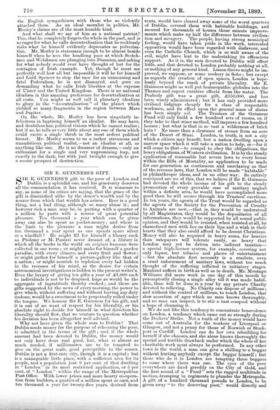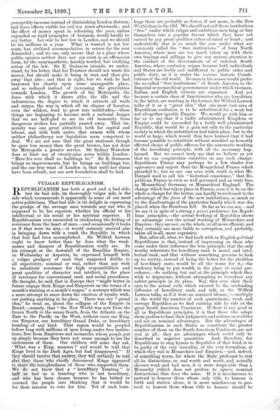SIR E. GUINNESS'S GIFT.
SIR E. GUINNESS'S gift to the poor of London and Dublin is a splendid one, and his generosity deserves all the commendation it has received. It is nonsense to say, as some of its critics are saying, that the grace of the gift is diminished alike by the donor's wealth and by the source from which that wealth has arisen. Beer is a good thing, not a bad thing, although so many abuse it; and however rich a man may be, in parting with a quarter of a million he parts with a source of great potential pleasure. Ten thousand a year which can be given away can also be spent as pocket-money ; and where is the limit to the pleasure a man might derive from ten thousand a year spent as one spends spare silver or a windfall ? He might fill for himself a library such as Ptolemy or M. Panizzi never dreamt of, a library in which all the books in the world on origines humane were collected in one room ; or might make for himself a garden paradise, with every climate, and every fruit and flower ; or might gather for himself a picture-gallery like that of a nation ; or might nourish to repletion every fad hidden in the recesses of his mind, as the desire for certain astronomical investigations is hidden in the present writer's. Even the luxury of giving ten gifts a year of £1,000 each to individuals is not to be despised, huge as would be the aggregate of ingratitude thereby evoked ; and there are gifts suggested by the news of every morning, the power to give which, without suffering and without leaving any duty undone, would be a sweetmeat to be perpetually rolled under the tongue. We honour Sir E. Guinness for his gift, and it is out of no want of respect for his liberality, or his absolute right to decide for himself in what direction his liberality should flow, that we venture to question whether his decision has been altogether well advised. Why not have given the whole sum to Dublin ? That Dublin needs money for the purpose of rehousing the poor, is admitted in the terms of the gift ; and if the whole amount had been devoted to Dublin, the money would not only have done real good, but, what is almost as much needed, if millionaires are to be tempted to give on the great scale, good perceptible to the senses. Dublin is not a first-rate city, though it is a capital.; but is a manageable little place, with a sufficient area for its people, and a population just 8 per cent. of that dwelling in " London" in its most restricted application, or 5 per cent. of " London " within the range of the Metropolitan Post Office. With lower prices and more hearty co-opera- tion from builders, a quarter of a million spent at once, and ten thousand a year for twenty-five years, derived from rents, would have cleared away some of the worst quarters of Dublin, covered them with habitable buildings, and secured for thousands of houses those minute improve- ments which make up half the difference between civilisa- tion and savagery. The people, having strong municipal feeling, would have taken pride in the work, interested opposition would have been regarded with disfavour, and even the Catholic Church, which is so well aware of the evil, might have lent to the undertaking its efficacious support. As it is, the sum devoted to Dublin will effect little, and that devoted to London probably nothing at all, or nothing of any general kind. Lisbon Grove might be im- proved, we suppose, or some rookery in Soho ; but except as regards the creation of open spaces, London is hope- lessly beyond the reach of private liberality. Sir E. Guinness might as well put homoeopathic globules into the Thames and expect curative effects from the water. The Peabody gift was a great gift, £350,000, and has been wisely administered ; but it has only provided more civilised lodgings cheaply for a class of respectable workmen, and its effect upon the general mass of slums has been simply nil. The Trustees of the Guinness Fund. will only build a few hundred sets of rooms, or, if they take to that wiser method, will improve a few hundred houses ; but what is that in so vast a wilderness of brick huts ? No more than a clearance of stones from an acre of the Desert of Sinai. London, in truth, is not a city which a citizen may benefit, but a nation dwelling upon a narrow space which it will take a nation to help, or—for it will come to that—to compel to obey the obligations, the heavy obligations, of Western civilisation. It is by the steady application of reasonable but severe laws to every house within the Bills of Mortality, an application to be made for one generation as continuous and unrelaxing as that of the revenue laws, that London will be made "habitable" in philanthropic ideas, and in no other way. So entirely convinced are we of this, that we believe if Sir E. Guinness had devoted the whole income of his gift to the steady prosecution of every provable case of sanitary neglect within a definite area, he would have accomplished more good than he will secure through his Trustees' exertions. In ten years, the agents of the Trust would be regarded as the agents of the Society for the Prevention of Cruelty to Animals are now,—that is, they would be understood by all Magistrates, they would be the depositaries of all informations, they would be supported by all sound public opinion, and they would be resisted, when resisted at all, by shamefaced men with lies on their lips and a wish in their hearts that they also could afford to be decent Christians. Money will also be required in heavy sums, far heavier than ratepayers will tolerate easily, so heavy that London may yet be driven into indirect taxation— a special high-licence system, for example, covering not only liquor, but tobacco and places of entertainment —but the absolute first necessity is a resolute, even a cruel enforcement of sanitary laws, without too much thought of the suffering inflicted in initiatory stages. Mankind suffers in birth as well as in death. Mr. Montagu Williams did more work in one day of this month by peremptorily closing a single alley till it was made habit- able, than will be done in a year by any private Charity devoted to relieving. No Charity can dispose of millions ; and without the control of millions, to touch London, that slow accretion of ages which no man knows thoroughly, and no man can inspect, is to stir a vast cesspool without a hope of cleansing it.
We do not like this tendency to concentrate benevolence on London, a tendency which came out so strongly during the Dockers' Strike. Not a tenth of the money would have come out of Australia for the workers of Liverpool or Glasgow, and not a penny for those of Norwich or Stock- port or Cardiff. London can do her own rebuilding for herself if she chooses, and she alone knows thoroughly the special and terrible drawback under which the whole of her charitable work must always be performed. In any other' town in the world, a man can give a shilling to a beggar without hurting anybody except the beggar himself ; but those who do it in London are tempting three beggars to come where there was one. The eyes of the poor everywhere are fixed greedily on the City of Gold, and the first sound of a "Fund" sets the ragged multitude in motion, ,tramping in regiments to plunder the Metropolis. A gift of a hundred thousand pounds to London, to be given away " to the deserving poor," would directly and perceptibly increase instead of diminishing London distress, and leave effects visible for evil ten years afterwards ; and the effect of money spent in rehousing the poor, unless expended on rigid principles of business, would hardly be any better. Let rent be but low in London, and we should be six millions in a year. What is wanted is not low rents, but civilised accommodation in return for the rent demanded ; and we can only secure that in a place where public opinion neither does nor can exist in an efficacious form, by the unsympathetic, harshly worded, but vivifying action of the law. Sir E. Guinness intends, we under- stand, by his letter, that his Trustees should not waste his money, but should make it bring in rent, and then give away that also ; and that is right, but we wish he had bestowed his charity upon some manageable place, and so reduced instead of increasing the gravitation towards London. The growth of the Metropolis, the force with which it draws alike the idle and the industrious, the degree to which it attracts all waifs and strays, the way in which all its cliques of fanatics, even the wildest, tend to grow into multitudes,—these things are beginning to become such a national danger that we are half-glad to see its old immunity from dangerous strikes has partially passed away. That im- munity was one great attraction both for capital and labour, and with both arrive that swarm with whom neither philanthropy nor legislation seem competent to deal. We are not sure that the great stationer, though he gave less money than the great brewer, has not done the Metropolis a greater service. Sir Sydney Waterlow does at least say of twenty-nine acres within London : " Here for ever shall no buildings be." Sir E. Guinness brings us improvements, but he brings us buildings too, and the one true want of London is, that until her slums have been rebuilt, not one new foundation shall be laid.







































 Previous page
Previous page